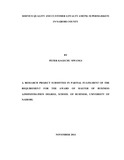| dc.description.abstract | In Kenya, supermarket sector has experienced a phenomenal growth in the last decade
due to changing tastes and preferences of consumers. This poses tight competition among
the supermarkets as well as from the traditional standalone retail shops. Consequently
supermarkets have appreciated the importance of attracting and creating a loyal customer
base through provision of superior shopping experience with emphasis on excellent
customer service and relationship retailing driven by strategy. This research attempts to
examine the relationship between service quality dimensions and customer loyalty as
well as establish the significance of each dimension in predicting customer loyalty among
the supermarkets in Nairobi County. Operationalization of service quality was done using
the SERVQUAL model while customer loyalty was operationalized using Dick and Basu
(1994) model. The study adopted a descriptive survey design with an aim of obtaining
state of affairs as they existed then and establish relationships among variables. The
population of the study was made of 47 supermarket stores from the four leading
supermarkets in turnover and branch presence in Nairobi County. The study utilized
primary data from the field as well secondary data from financial records and industry
publications. Primary data was collected through questionnaires with closed and open
ended questions administered to customers exiting the store and had shopped at least
thrice in that store over the last 12 months. Data analysis was done using statistical
package for social sciences (SPSS) .Analysis was done using descriptive and inferential
statistics presented in tables. Study findings revealed that tangibility, reliability, empathy,
responsiveness and assurance are positively associated with customer loyalty. Reliability
was found to be the most significant predictor of customer loyalty and responsiveness
was found to have the least prediction power when the dimensions are analyzed
independently. However, Tangibility was found to have the highest significance in
predicting customer loyalty when all the dimensions are analyzed together while
Responsivess was the least significant. Qualitative information indicated that other
factors that influence customer loyalty but not included in the model like affordable
prices, home deliveries, extended opening hours, loyalty programmes, quality and variety
of products in stock, spacious parking and financing plans for expensive items also need
to be explored by management. | en_US |

